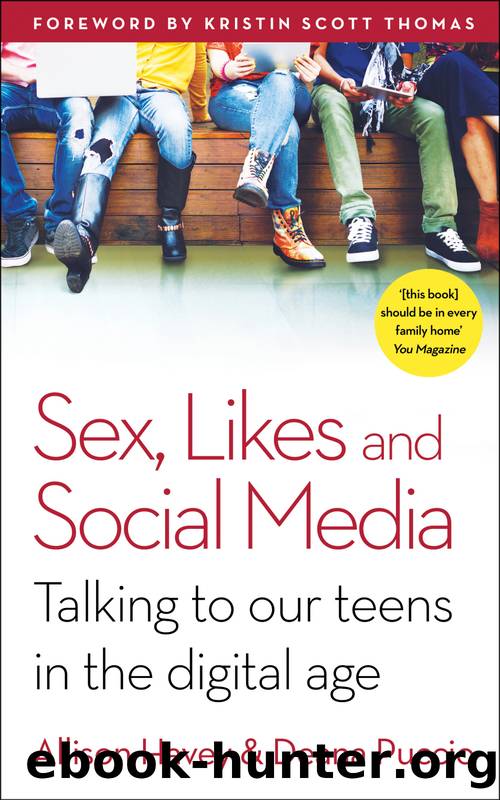Sex, Likes and Social Media by Deana Puccio

Author:Deana Puccio
Language: eng
Format: epub
Publisher: Ebury Publishing
In the TEDx Talks and websites porn addicts have directed us towards, there is a lot of talk of neural pathways and neuroplasticity or brain plasticity. Gary Wilson, founder of pornonthebrain.com, defines neuroplasticity as: âthe lifelong ability of the brain to reorganise neural pathways based on new experiences. Neuroplasticity does not consist of a single type of brain change, but rather includes several various processes that occur throughout an individualâs lifetime.â Wilson has an excellent TEDx Talk, in which he explains that the more men watch porn, the more their neural pathways become accustomed to the visual stimulation. These pathways become like well-worn highways, as they are travelled over and over again. This promotes an addiction to porn and leads to problematic sexual performance in real life intimate situations. Further, we ask if there is any scientific evidence that watching too much pornography causes actual harm to the brain to the person who is watching it? Yes. According to University of Cambridge neuropsychiatrist Dr Valerie Voon, the brain of a person addicted to porn exhibits the same changes as a person with a drug addiction.
So it appears that in the same way a drug addict âcravesâ drugs, a person who becomes addicted to porn craves porn. In our brain, we have something called a reward centre. In our reward centre a chemical called dopamine is released, giving us a âhighâ that we feel when we have accomplished something. Dopamine is released when one experiences moments of sexual excitement and novelty. Because porn contains so many ânovelâ visuals, from the number of naked images that can be seen in a very short period of time, to the varying sexual acts portrayed, the more these images are reinforced, the more likely the userâs sexual tastes will alter as well. Therefore this chemical that gives us such a âhighâ gets triggered without having to do much to accomplish its goal. For years, scientists believed that at a certain point, our brains were âfixedâ; however, scans show that porn can actually alter the reward centre. This change in the reward centre triggers porn users to compulsively search for a new way to get this dopamine âhighâ. As for someone taking drugs, who needs more drugs or a higher dose to produce the same high they first experienced, when someone watches too much pornography for them to experience a âhighâ, or sexual arousal, they need to have the boundaries pushed further to do so. They, too, develop a tolerance to it. This is a problem.
As parents, and as co-founders of The RAP Project, we believe that the taboo surrounding online porn needs to be lifted. There are different approaches to this, but open conversation about healthy relationships in contrast to porn seems to be unanimous. Dr Lisa Damour, an American psychologist specialising in adolescence, blogged some interesting advice: âPornography depicts one shadowy and loveless corner of the vast landscape of human sexuality. Your teenager might profess a sophisticated understanding of the many varieties of sexual
Download
This site does not store any files on its server. We only index and link to content provided by other sites. Please contact the content providers to delete copyright contents if any and email us, we'll remove relevant links or contents immediately.
| Early Childhood | Parenting Boys |
| Parenting Girls | School-Age Children |
| Single Parents | Teenagers |
The Lost Art of Listening by Michael P. Nichols(7492)
Rich Dad Poor Dad by Robert T. Kiyosaki(6608)
We Need to Talk by Celeste Headlee(5608)
I Love You But I Don't Trust You by Mira Kirshenbaum(3859)
The Complete Idiot's Guide to Coping With Difficult People by Arlene Uhl(3145)
Rich Dad Poor Dad: What The Rich Teach Their Kids About Money - That The Poor And Middle Class Do Not! by Robert T. Kiyosaki(2949)
A Burst of Light by Audre Lorde(2597)
The Book You Wish Your Parents Had Read (and Your Children Will Be Glad That You Did) by Philippa Perry(2508)
Dealing with People You Can't Stand by Dr. Rick Brinkman(2458)
Life Hacks by Dan Marshall(2448)
An Odyssey by Daniel Mendelsohn(2305)
The Expectant Father by Armin A. Brott & Jennifer Ash(2269)
Teach Your Child How to Think by Edward De Bono(2155)
No Time to Say Goodbye(2112)
What I Need by J. Daniels(2075)
The 7 Habits Of Highly Effective Teens by Covey Sean(2074)
The Out-of-Sync Child by Carol Stock Kranowitz(2049)
The Anxious Generation by Jonathan Haidt(2015)
I Don't Belong to You by Keke Palmer(1991)
